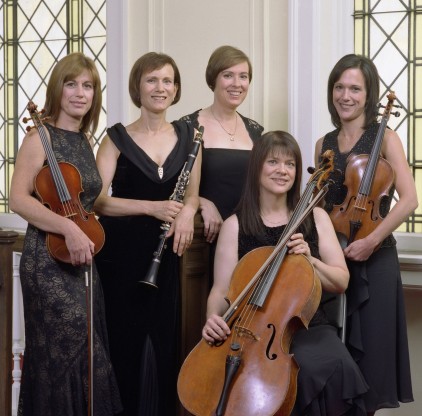Orion Ensemble digs up another gem with DuBois Quintet

For 18 seasons, the Orion Ensemble has provided their unique brand of venturesome programming and fluent, polished performances to Chicago-area audiences.
For the group’s second season program, the Orion musicians presented a typically offbeat “French” program (Cesar Franck was actually Belgian but never mind) Wednesday night at Ganz Concert Hall.
The group has been especially inspired at unearthing neglected Late Romantic nuggets by such obscure composers as Joseph Labor and Walter Rabl. So it proved again Wednesday with the Orion’s performance of the Quintet in F major by Theodore DuBois.
An acclaimed pianist and organist in his day, DuBois (1837-1924) is nowadays better known in his native France than outside of it, primarily for his religious music. But DuBois was also an exceptionally prolific chamber-music composer, writing more than 200 works in the genre.
Based on the richly melodic Quintet, there is a wealth of worthy music here waiting to be rediscovered. Originally cast for oboe, piano and string trio, DuBois’s alternative version for clarinet was performed Wednesday and quite winningly too by the Orion members.
The opening Allegro launches the Quintet with a soaring theme assigned to clarinet and then passing to the strings. The French composer’s gracious flow of melody is almost Schubertian in its richness and his quicksilver alternation of parts between all five players shows genuine craft and distinction. The ensuing Canzonetta theme is charming, following by a more darkly lyrical Adagio, here spotlighted by fine playing by clarinetist Kathryne Pirtle and violinist Florentina Ramniceanu at the coda.
Perhaps the finale with its somewhat hectic coda is not quite on the same level, but this is still a terrific work and a fine discovery, served with eloquent and fully committed advocacy by the Orion musicians.
In the right hands, the alternative arrangement for cello of Franck’s Violin Sonata in A minor can be just as effective as the original, as proved by Yo-Yo Ma and others who have elected to perform it.
The Orion Ensemble presented Franck’s multihued sonata in two versions Wednesday with cellist Judy Stone playing the first two movements and Ramniceanu, the final two sections in the traditional violin version
This is one of those ideas that probably looked good on paper but proved less successful in actuality.
Stone’s cello playing drew us right into the intimate, dreamy quality of the opening Preludio and, with superb keyboard work by Diana Schmück, brought out the vigor of the ensuing Allegro.
Any performance is a continuum and so it was a bit jarring to have the cellist yield the stage of her involving performance to her violinist colleague, just when one’s ears have grown accustomed to the darker string instrument. Ramniceanu played sensitively and with technical poise—apart from briefly losing her place in the finale—but this hybrid proved a decidedly bifurcated experience. It would be better to have the two string players split the remaining two concerts of this program with each doing a complete version of the Franck. Schmück’s piano playing, however, was first-class throughout
The concert opened with another rarity, Jean Françaix’s Trio for clarinet, viola and piano.
The French pianist-composer lived a long and productive life, from a prodigy encouraged by Ravel to his death at 85 in 1997. His Trio is a late work dating from 1990 but could have been written seven decades earlier, mixing an introspective lyricism with frothy Satie-like high spirits.
While conscientious and alert, Wednesday’s literal performance felt like something of a work in progress, missing too much of the wit and Boulevardier esprit, though Pirtle and Schmück proved in synch with the spirited virtuosity of the closing Presto.
The program will be repeated 7 p.m. Sunday at Fox Valley Presbyterian Church in Geneva and 3 p.m. Nov. 28 at the Music Institute of Chicago in Evanston. orionensemble.org; 630-628-9591.
Posted in Performances


Posted Nov 22, 2010 at 8:06 am by L. Paul Lewis
I enjoyed this review for the most part but was disappointed that it omitted any mention of Jennifer Marlas, who made a distinctive, beautiful contribution to the Dubois, and dispatched the virtuosic viola part of the Francaix with daredevil brio and artistry. The brillance and high spirits of the work certainly seemed to hit home with the audience at large, and nothing was missing for this listener.
L. Paul Lewis